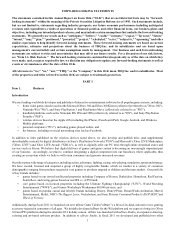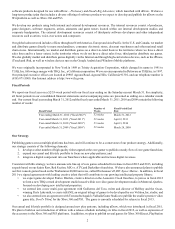THQ 2011 Annual Report Download - page 19
Download and view the complete annual report
Please find page 19 of the 2011 THQ annual report below. You can navigate through the pages in the report by either clicking on the pages listed below, or by using the keyword search tool below to find specific information within the annual report.Video game product development schedules are difficult to predict and can be subject to delays. Postponements in shipments
can substantially impact our sales and profitability in any given quarter.
Our ability to meet product development schedules is impacted by a number of factors, including the creative processes
involved, the coordination of large and sometimes geographically-dispersed development teams required by the complexity of
our products, the need to localize certain products for distribution outside of the U.S., the need to refine our products prior to their
release, and the time required to manufacture a game once it is submitted to the platform manufacturer. In the past, we have
experienced development and manufacturing delays for several of our products. Failure to meet anticipated production schedules
may cause a shortfall in our expected sales and profitability and cause our operating results in any given quarter to be materially
different from expectations. Delays that prevent release of our products during peak selling seasons or in conjunction with specific
events, such as the release of a related movie, could significantly impact the sales of such products and thus our profitability.
We rely on external developers for the development of some of our titles.
Some of our games are developed by third-party developers. While we own approximately 15% of Yuke's, the developer
of our UFC Undisputed and some of our WWE-based games, we do not have direct control over the business, finances and
operational practices of these external developers, including Yuke's. A delay or failure to complete the work performed by external
developers has and may in the future result in delays in, or cancellations of, product releases. Additionally, the future success of
externally-developed titles will depend on our continued ability to maintain relationships and secure agreements on favorable
terms with skilled external developers. Our competitors may acquire the businesses of key developers or sign them to exclusive
development arrangements. In either case, we would not be able to continue to engage such developers' services for our products,
except for those that they are contractually obligated to complete for us. We cannot guarantee that we will be able to establish or
maintain such relationships with external developers, and failure to do so could result in a material adverse impact on our business
and financial results.
Defects in our game software could harm our reputation or decrease the market acceptance of our products.
Our game software may contain defects. In addition, because we do not manufacture our games for console platforms,
we may not discover defects until after our products are in use by retail customers. Any defects in our software could damage our
reputation, cause our customers to terminate relationships with us or to initiate product liability suits against us, divert our
engineering resources, delay market acceptance of our products, increase our costs or cause our net sales to decline.
We are a software company and have limited experience developing hardware products. Our uDraw may experience quality
or supply problems or may fail to achieve our sales expectations, which could negatively impact our net sales and profitability.
uDraw is our first hardware product. Hardware products can be highly complex and can have defects in design,
manufacture, or associated software. We could incur significant expenses, lost revenue, and reputational harm if we fail to detect
or effectively address such issues through design, testing, or warranty repairs. In addition, we obtain some components of our
hardware devices from sole suppliers. If a component delivery from a sole-source supplier is delayed or becomes unavailable or
industry shortages occur, we may be unable to obtain timely replacement supplies, resulting in reduced sales. Either component
shortages or excess or obsolete inventory may increase our cost of sales. uDraw is assembled in China; disruptions in the supply
chain may result in console shortages that would affect our net sales and profitability.
Our business is dependent upon the success and availability of the video game platforms on which consumers play our games.
We derive most of our net sales from the sale of products for play on video game platforms manufactured by third parties,
such as PS3, Xbox 360, and the Wii and DS. The following factors related to such platforms can adversely impact sales of our
video games and our profitability:
Popularity of platforms. According to the International Development Group, Inc. ("IDG"), an independent consulting and
advisory services company that analyzes the consumer electronics and interactive entertainment industries, in the current platform
cycle, the Wii is the best-selling console platform to date. However, recent trends indicate that the PS3 and Xbox360 gained
popularity over the twelve months ended March 31, 2011. We expect this trend to continue in fiscal 2012. Since the typical
development cycle for a console, handheld, or PC game is from 9 to 36 months, we must make decisions about which games to
develop on which platforms based on current expectations of what the consumer preference for the platforms will be when the
game is finished. Launching a game on a platform that has declined in popularity, or failure to launch a game on a platform that
has grown in popularity, could negatively impact our net sales and profitability.
Platform pricing. Platforms can be expensive – in the United States, console pricing ranges from $149.99 for the Wii to
10
























